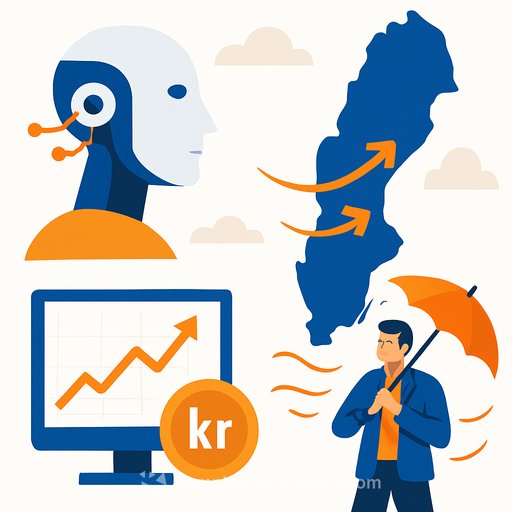How Karnov Group's AI Legal Platform Launch Could Shift the Investment Story
On September 26, 2025, Karnov Group AB (publ) (OM:KAR) announced an AI-based legal solution for municipalities in Denmark and Sweden. The product integrates local regulations and proprietary legal content into caseworker workflows. It is developed with Norstedts Juridik on a shared AI platform, pairing scale with local expertise for public sector use.
What this means for municipal legal teams
- Faster intake-to-opinion cycles by surfacing relevant local rules, commentary, and precedent in one place.
- Draft support for memos and responses with citations back to authoritative sources.
- Consistency across caseworkers through templated reasoning and audit trails.
- Lower context switching by embedding the tool into daily systems rather than separate search portals.
For governance, expect controls around data residency, model behavior logging, and citation traceability. Municipal buyers will want clear proof of source coverage for local bylaws and administrative guidance.
Platform strategy in brief
Karnov is pursuing a cross-border platform with shared AI capabilities and localized content layers. The launch in Denmark and Sweden builds on the earlier K+ Smart Chat trials in Spain, suggesting a push to bring premium AI features to regions with different maturity levels and content sets.
This structure can lower unit costs per feature while preserving jurisdiction-specific depth through partners such as Norstedts Juridik. Execution, however, depends on data quality, editorial refresh rates, and seamless integrations with municipal systems.
What does not change yet
- Region South still faces slower organic growth and softer offline revenue.
- Adoption risk: paid usage in core markets may cluster in early adopters before broad rollout.
- Pricing risk: if buyers resist AI surcharges, margins and ARPU could lag expectations.
KPIs legal leaders and investors should watch
- Attachment rate of AI features across municipal accounts.
- Weekly active users per seat and query-to-citation conversion rates.
- Time-to-value from pilot to production and renewal uplift at 12 months.
- Churn trends in legacy products as AI packages scale.
- Cross-sell into adjacent public bodies (agencies, regions, courts).
- Content coverage breadth for local regulations and update latency.
Financial trajectory implied by current narratives
The outlook points to SEK 3.0 billion revenue and SEK 638.9 million earnings by 2028. That implies roughly 3.6% annual revenue growth and a step-up of SEK 575.7 million from current earnings of SEK 63.2 million.
One fair value estimate sits at SEK 123.67 per share, indicating about 11% upside to the current price; community estimates range from SEK 123.67 to SEK 147.99. To support those levels, Karnov will need rising AI penetration, stable gross margins, efficient sales cycles in the public sector, and progress on Region South headwinds.
Procurement checklist for municipal legal teams
- Security and privacy: data residency options, encryption at rest/in transit, audit logs.
- Model governance: provenance, evaluation benchmarks, red-teaming, and prompt/response logging controls.
- Citations: mandatory source links with date stamps and jurisdiction tags.
- Integration: SSO, role-based access, DMS/ECM connectors, and API rate limits.
- Content operations: update cadence for statutes, bylaws, and agency guidance.
- Human-in-the-loop: review steps for sensitive decisions and clear escalation paths.
- Commercials: seat tiers, usage caps, overage pricing, and exit/portability clauses.
Questions investors can put to management
- What is the median time from pilot start to paid rollout in municipalities?
- How much of the AI answer set relies on proprietary content versus public sources?
- What model providers are used, and are there private or on-prem options?
- Expected AI-driven ARPU uplift and gross margin effect by segment.
- Share of revenue tied to AI features by 2026 and renewal uplift on AI-attached accounts.
- Progress and productization in Spain following K+ Smart Chat trials.
- Plan to offset offline revenue declines in Region South.
Compliance watch
Public sector deployments should map to the EU's legislative framework and procurement rules. For reference, see the EU AI Act materials on EUR-Lex and align vendor controls with risk-tier requirements.
Training your legal team
The fastest wins come from focused, role-based training tied to daily matters and policy templates. If you need structured programs, explore curated options by job function here: Complete AI Training.
Bottom line
Karnov's municipal AI rollout is a logical step for its platform strategy and could improve stickiness in public sector accounts. The investment case still hinges on broader adoption, pricing discipline, and resolving Region South softness. Watch deployment speed, renewal uplift, and AI feature attachment to gauge how much of the 2028 growth path can be realized.
Your membership also unlocks:





